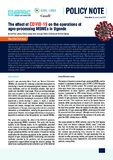| dc.contributor.author | Kahunde, Rehema | |
| dc.contributor.author | Sunday, Nathan | |
| dc.contributor.author | Sserunjogi, Brian | |
| dc.contributor.author | Lakuma, Corti Paul | |
| dc.contributor.author | Ogwang, Ambrose | |
| dc.coverage.spatial | Uganda | en |
| dc.date.accessioned | 2022-01-07T09:09:10Z | |
| dc.date.available | 2022-01-07T09:09:10Z | |
| dc.date.issued | 2021-08 | |
| dc.identifier.citation | Kahunde, R., Sunday, N., Sserunjogi, B., Lakuma, C.P. and Ogwang, A. (2021) 'The Effects of COVID-19 Lockdowns on Ugandan Businesses: A Comparison of the 2020 and the 2021 Lockdowns', The Uganda Business Climate Index, Special Issue 3, Kampala: The Economic Policy Research Centre | en |
| dc.identifier.uri | https://opendocs.ids.ac.uk/opendocs/handle/20.500.12413/17023 | |
| dc.description.abstract | The Uganda government instituted a second COVID-19 lockdown in June 2021 for 42 days to contain the health impact of the second wave of the pandemic. This slowed and, in some cases, halted business recovery from the March 2020 lockdown. In addition, schools that had barely recovered from the 2020 lockdown were closed, worsening employment prospects for teachers. Using a random weighted sample of 149 businesses and 44 schools spread across 22 districts, this report compares the effects on businesses of the first lockdown to that of the second. The results suggest a higher reduction in business activity and demand for products of 70 percent of businesses in the second lockdown.
Enterprise constraints to accessing inputs and credit marginally eased during the 2021 lockdown relative to the 2020 lockdown for more than 60
percent of the businesses. The result from schools suggests that before the second lockdown, 48 percent of schools were in financial distress, and 21 percent had resorted to selling off assets such as land and buildings. More schools, 33 percent, stopped paying staff salaries, compared to 25 percent of schools in the 2020 lockdown. Few teachers received the COVID cash transfer from the government. The study recommends equity in the support to firms, businesses and schools; and employees, especially teachers, who have lost their businesses, jobs and livelihood. In this
case, the identification and location of the vulnerable people is critical if government support is to be accessed by the intended beneficiaries. The use of local government structure to identify the poor in their communities would be pertinent in this regard. | en |
| dc.language.iso | en | en |
| dc.publisher | The Economic Policy Research Centre (EPRC) | en |
| dc.relation.ispartofseries | The Uganda Business Climate Index;;Special Issue 3 | |
| dc.rights.uri | http://creativecommons.org/licenses/by/4.0/ | en |
| dc.subject | Economic Development | en |
| dc.title | The Effects of COVID-19 Lockdowns on Ugandan Businesses: A Comparison of the 2020 and the 2021 Lockdowns | en |
| dc.type | Series paper (non-IDS) | en |
| dc.rights.holder | © 2021 Economic Policy Research Centre. All Rights Reserved. | en |
| dc.identifier.externaluri | https://eprcug.org/publication/the-effects-of-covid-19-lockdowns-on-ugandan-businesses-a-comparison-of-the-2020-and-the-2021-lockdowns/?wpdmdl=14390&refresh=61d444aa55f821641301162 | en |
| rioxxterms.version | VoR | en |


